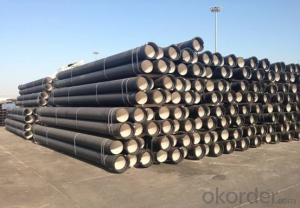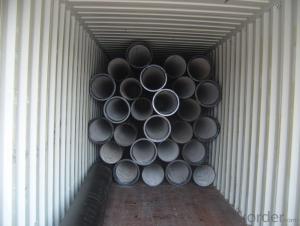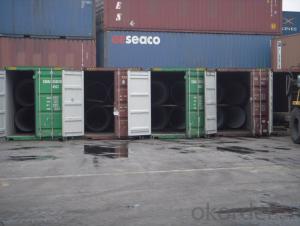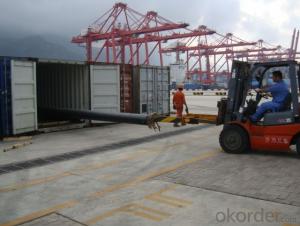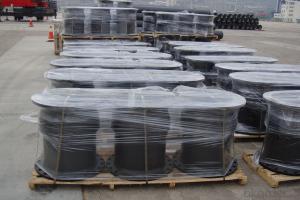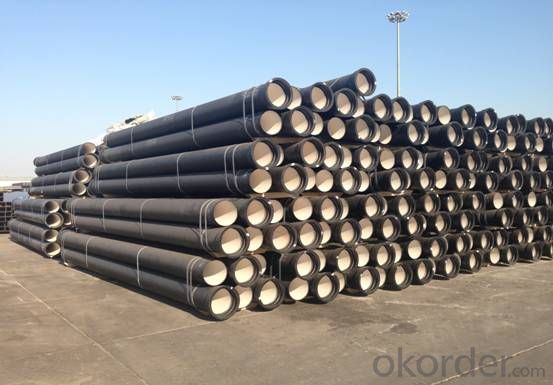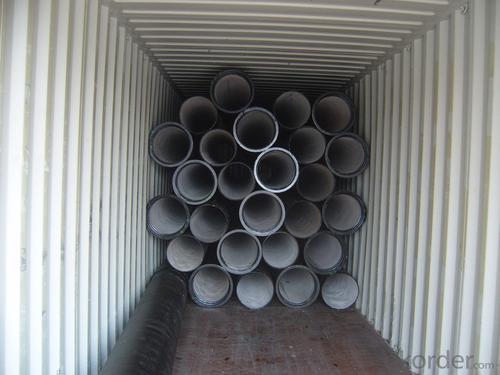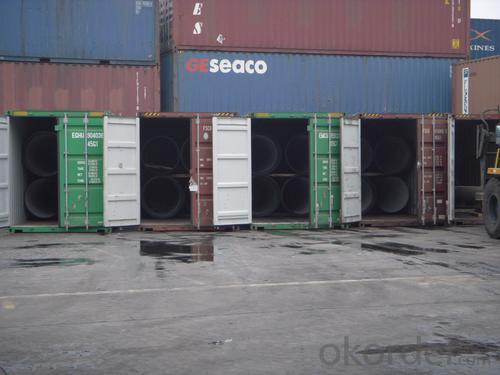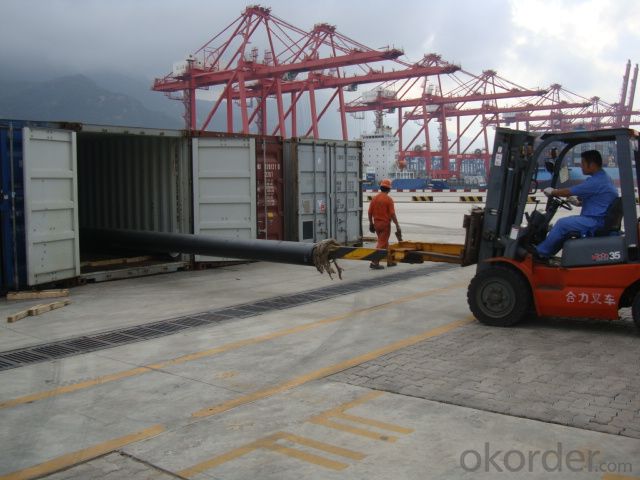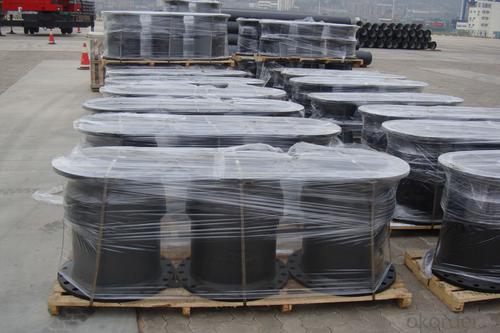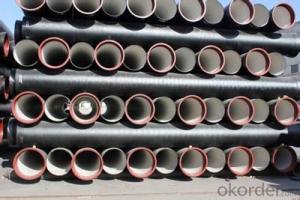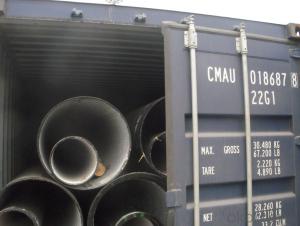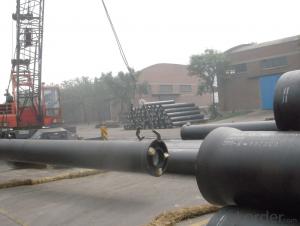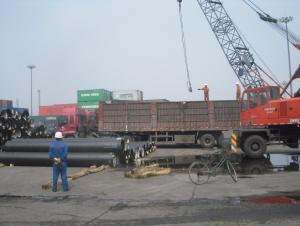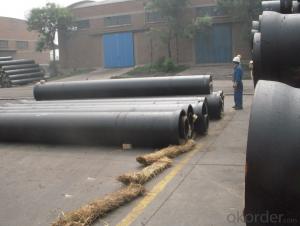DUCTILE IRON PIPES K8 DN600
- Loading Port:
- China Main Port
- Payment Terms:
- TT OR LC
- Min Order Qty:
- -
- Supply Capability:
- -
OKorder Service Pledge
OKorder Financial Service
You Might Also Like
Ductile Iron Cast Pipe is without any defects compare with tradition casting tech, which has many advantages particularly as follow:
(1) High density. In the "vertical upward casting" process, the melt iron of centre liquid column in center crystallizer is continuously feeding for volume shrinkage caused by condensation tube at outer circumference , which lead to be free of shrinkage porosity.
(2) High purity. When melt iron pouring, the mixed impurities such as gas, dross, sand grain which are lighter than melt iron could be eliminated at furnace mouth, its impossible to enter into the crystallizer through the channel, so the melt iron into the crystallizer is very pure.
(3) Strength with toughness. The cooling speed provided by continuous crystallizer is 30 times than sand casting and 5 times than centrifugal casting, and doesn't produce white iron, the eutectic cell volume of continuous cast iron is one eighth to one tenth compare with traditional cast iron. The density of graphite nodule in ductile iron can reach 300-700 pcs/mm2. Therefore, all reason above improve the strength and toughness of continuous cast iron.
(4) Free machining. The high speed cooling make the hardening phase (such as boride, steadite) not appear like reticular, massive or thick, but diffuse like fish bone and pane in shape, moreover, there are tiny graphite flakes inlaid hardening phase. It's free machining in BrinellHardness the range of 250-300HB. However, the Brinell Hardness of 250 is top limit to common metal materials.
(5) Uniform composition of tube wall. The convection mixing of liquid column caused by marching type drawing in crystallizer make the composition of tube wall well-distributed, and concentration gradient very little.
(6) High productivity. To the wall thickness of tube under 10mm, the speed of continuous casting is 1 meter/min, to the wall thickness of tube under 20mm, the speed of continuous casting is 0.5 meter/min, which is high efficiency that centrifugal or other casting tech couldn't reach.
- Q: Do ductile iron pipes require internal lining for potable water applications?
- Yes, ductile iron pipes do require internal lining for potable water applications. This is because the iron used in these pipes can react with the water and potentially contaminate it. Internal lining acts as a barrier between the water and the iron, preventing any chemical reactions and ensuring the water remains safe for consumption.
- Q: Ductile iron pipe joint damage, water leakage, want to see the connection with other pipe fittings, how to operate?!
- The ductile iron pipe can be used as the plugging device for the big part
- Q: Can ductile iron pipes be used for trenchless installation methods?
- Yes, ductile iron pipes can be used for trenchless installation methods. Trenchless installation methods are techniques used to install underground pipes without the need for extensive digging or trenching. Ductile iron pipes are a strong and durable choice for these methods due to their high tensile strength and flexibility. They can be installed using various trenchless techniques such as horizontal directional drilling (HDD), pipe bursting, and slip lining. These methods allow for efficient and cost-effective installation of ductile iron pipes without disrupting the surrounding environment. Additionally, the corrosion resistance of ductile iron pipes makes them suitable for trenchless installations in various soil conditions and environments.
- Q: Can ductile iron pipes be used in areas with high soil salinity?
- Indeed, areas with high soil salinity can accommodate the use of ductile iron pipes. These pipes possess notable resistance to corrosion, rendering them compatible with different soil conditions, even those with elevated salinity levels. Usually, these pipes are coated with a safeguarding layer, such as polyethylene or zinc, which bolsters their capacity to ward off corrosion caused by saltwater or saline soils. Furthermore, employing appropriate installation methods, such as meticulous backfilling and soil compaction around the pipes, can effectively mitigate the potential consequences of high soil salinity on the durability and effectiveness of ductile iron pipes.
- Q: Can ductile iron pipes be used in marine environments?
- Ductile iron pipes are suitable for marine environments due to their excellent mechanical properties, high corrosion resistance, and durability. These pipes are made of a type of cast iron known as ductile iron, which can withstand the harsh conditions of marine environments. Marine environments are known for their high levels of corrosion caused by saltwater, humidity, and other harsh factors. However, ductile iron pipes are specifically designed to endure these conditions. They have a protective layer called the "graphite skin" that acts as a barrier against corrosion. This graphite skin prevents rust formation and safeguards the pipes from degradation. Additionally, ductile iron pipes can be further protected with coatings or linings to enhance their corrosion resistance in marine environments. These protective coatings, such as epoxy, polyurethane, or zinc coatings, provide an extra layer of defense against corrosion. This ensures the pipes' longevity and reliability in marine environments. To maintain optimal performance, regular maintenance and inspection are crucial for ductile iron pipes in marine environments. This includes regular cleaning to remove marine growth or debris that may accumulate on the pipes and conducting routine inspections to identify any signs of corrosion or damage. In conclusion, ductile iron pipes are a suitable choice for marine environments. Their inherent corrosion resistance, durability, and the ability to apply additional protective coatings make them ideal for various marine applications.
- Q: Can the sealing ring of ductile iron pipe be reused?
- It is better not to have used things, easy aging, sealed, the best to use new
- Q: Can ductile iron pipes be used for water treatment plants?
- Yes, ductile iron pipes can be used for water treatment plants. Ductile iron pipes are often chosen for water treatment plants due to their durability, strength, and corrosion resistance. They can handle high-pressure water systems and are resistant to wear and tear, making them suitable for transporting treated water in large quantities. Additionally, ductile iron pipes have a long lifespan, which reduces the need for frequent replacements and maintenance, making them a cost-effective choice for water treatment plants.
- Q: What's the difference between ductile iron pipe and cast iron pipe?
- We have to correct now basically all socket ductile iron pipes, because the socket type with a rubber ring, plus a ductile material, buried beneath it when the bearing has a certain flexibility, not because of the deformation and leakage phenomenon. To be used, not Unicom cast iron pipe socket, connection is used similar to the stainless steel hoop hoop sleeve closed.
- Q: Are ductile iron pipes suitable for horizontal directional drilling?
- Yes, ductile iron pipes are suitable for horizontal directional drilling due to their high strength and flexibility, which allows them to withstand the stress and bending forces during the drilling process.
- Q: Can ductile iron pipes be used for underground fire protection systems?
- Yes, ductile iron pipes can be used for underground fire protection systems. Ductile iron has excellent strength and durability, making it suitable for handling the high pressures and extreme conditions associated with fire protection systems. Additionally, it has good corrosion resistance, allowing the pipes to withstand exposure to moisture and other underground elements.
Send your message to us
DUCTILE IRON PIPES K8 DN600
- Loading Port:
- China Main Port
- Payment Terms:
- TT OR LC
- Min Order Qty:
- -
- Supply Capability:
- -
OKorder Service Pledge
OKorder Financial Service
Similar products
Hot products
Hot Searches
Related keywords
